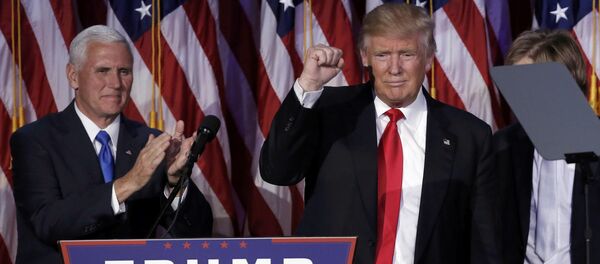Speaking to Sputnik Arabic about Trump's unexpected victory, Samir stressed that "the choice of the American people has been a historic turning point for US foreign policy."
"This choice," the academic explained, "is removed from the policy of intervention in the internal affairs of other countries."
Samir stressed that a majority of Americans demonstrated their sympathy for Trump at the voting booth in part thanks to his promise to stabilize the situation in the Middle East, and to cooperate with Russian President Vladimir Putin to resolve the crisis in Syria.
Trump opponent Hillary Clinton had on the contrary vowed a 'get tough' approach to Russia, and promised a no-fly zone in Syria, which even a top US general recently admitted would necessitate war with Russia.
Samir recalled that the Clinton campaign had worked intensely to create a negative image of Trump among Muslim Americans, and in the Muslim world in general. However, "whatever was said about Trump, including the idea that his remarks were directed against Muslims, people made an independent decision and decided to vote for him. He even got the vote of Arabs, Africans, Mexicans."
Ultimately, the analyst suggested that in his victory speech, Trump was able to convince other countries that the United States will continue to take a leading position in the world, but will not forget about justice and equity in relation to other countries.
However, in 2013, General Abdel Fattah el-Sisi, the head of the Egyptian Armed Forces, took control of the country, clamping down on the Muslim Brotherhood and declaring it a terrorist group.
On Wednesday, the Egyptian presidential administration revealed that President Sisi had been the first foreign leader to congratulate Trump with victory. Trump met with Sisi in September in New York, praising him for his campaign to stamp out terrorism. In Wednesday's phone call, Trump expressed hope to meet with Sisi in the near future for talks.



